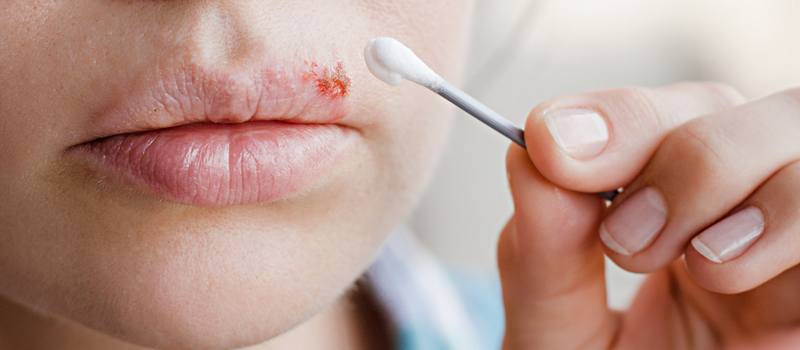What are cold sores and how to relieve them
Published June 17, 2022

What are cold sores?
Cold sores are a common condition characterised by a painful blister-like eruption on the lips or skin around the mouth, nose and chin, cold sores can make sufferers self-conscious and cause psychosocial stress.
Cold sores can recur periodically and while there is no cure for cold sores, you can help soothe cold sores and reduce their recurrence.
What are cold sore symptoms?
Most people experience localised itching and tingling a day or two before the cold sore appears.
This leads to a collection of small blisters which can be accompanied by pain, tenderness and a sensation of heat and burning. The blisters burst after a few days, developing a crust. The crust eventually dries up and falls off after 10–14 days.
What can trigger a cold sore?
Most people get their first cold sore when they are young. While symptoms may remain dormant in many people, several factors can trigger a cold sore in others:
Tiredness and fatigue
If you’re prone to cold sore outbreaks, make sure you’re getting enough sleep, eating well and looking after yourself.
Broken skin near the affected area
Injury to the area where you normally develop cold sores can trigger an attack. Dental procedures can also be a concern. Take care around your nose and lips when shaving and when drinking hot drinks.
Getting your period
If you know you’re prone to outbreaks at the onset of your menstrual cycle, carry a topical ointment with you to use at the first sign of the cold sore developing.
Stress or emotional upsets
It’s not uncommon for a cold sore to pop up during stressful events such as a wedding or starting a new job. If you know stress is a trigger for an outbreak, add some yoga or meditation to your routine to keep your stress hormones in check.
Strong sunlight, cold or wind
Strong sunlight or cold winds can bring on a cold sore. Protect your lips from the elements by wearing a scarf in winter and lip balm or facial moisturiser in summer.
Reduce alcohol intake
Monitor your alcohol consumption if you know this can trigger cold sores for you.
Catching a cold
When winter hits, make sure you wash your hands frequently, eat well and stay hydrated to help ward off infection. Getting run down with the sniffles that can trigger a cold sore outbreak.
Physical strain
Love sport? Strenuous sporting activities or work can trigger cold sores in some people. Watch your physical activity if you’re getting frequent outbreaks.
How long do cold sores last?
Cold sores usually clear up after approximately two weeks without leaving scars. While the sores are healing, it’s important to protect them from the sun. A lip balm with an SPF30 can help protect your lips.
How to cope with cold sores?
There are several things you can do to help cope with cold sores. It’s important during an outbreak not to pick at the scab or break blisters as this could cause a secondary bacterial infection.
Try the following options to help with a cold sore outbreak:
Ice
Applying ice or a washcloth soaked in icy-cold water to the blister may help ease symptoms.
Painkillers
Painkillers may occasionally be required to relieve symptoms. Speak to your healthcare practitioner about which product is right for you.
Cold sore medications
Cold sore medications come in many forms, including creams and tablets and may relieve the symptoms of facial cold sores. Speak to your healthcare practitioner to see if these medications are right for you.
How to reduce the frequency of cold sores?
Here are some tips to help reduce cold sore outbreaks:
Know your triggers
Avoid the things that trigger your cold sores, such as stress, poor diet, alcohol intake or using tanning beds. Check out our list of triggers above.
Use a lip balm or sunscreen
Too much sunlight can cause cold sores to flare, especially in sunny Australia. Use a lip balm and sunscreen with an SPF30 to help protect your lips.
Wash your hands
When you have a cold sore, wash your hands often, and try not to touch your sore. This can help keep you from spreading cold sores to your eyes or other people.
Don’t share personal items
Avoid sharing towels, razors, silverware, toothbrushes, or other personal items a person with a cold sore may have used.
Lysine
Lysine may:
- Support collagen formation
- Reduce occurrence of facial cold sores
- Relieve symptoms of facial cold sores
Find lysine in Nature’s OwnTM Double Strength Cold Sore Relief .
Always read the label and use only as directed.
Zinc
Zinc is a mineral and it’s regarded as an essential trace element because you need small amounts of zinc to maintain human health. Zinc is needed to maintain a healthy immune system function and for wound healing and skin health.
Find Zinc in the Nature’s Own Cold & Immunity Range.
Talk to your doctor
Talk to your doctor if you get frequent outbreaks. Medications may be of benefit.
Cold sores are very common and while they can cause pain and discomfort, you can reduce your incidence of infection. Knowing your triggers and using nutrients to support your immune system function and support wound healing can help you manage your cold sore symptoms, helping you feel more in control.
MAT-AU-2200511
Learn about which Nature's Own product may be appropriate for you.
SEE THE PRODUCTS HERE







